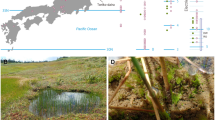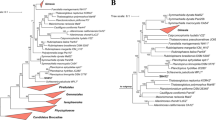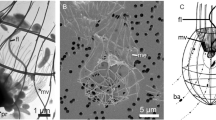Abstract
FIVE strains of Saprospira grandis Gross, an apochlorotic cyanophyte or flexibacterium, have been isolated in pure culture from several marine littoral habitats around the United States1. In all strains the filaments tend to fragment and the individual cells to lyse at the end of the growing period. For example, a 10-ml. culture in a 50-ml. flask, grown in a sea-water medium containing 5 g/l. tryptone and 5 g/l. yeast extract (Difco) and shaken gently but constantly at 30°, forms within 1–2 days after inoculation a dense peach-coloured suspension with a satiny sheen; under the microscope it is seen to be full of helical filaments. A day or two later the sheen disappears, the colour becomes duller, and no microscopically intact or viable cells remain.
This is a preview of subscription content, access via your institution
Access options
Subscribe to this journal
Receive 51 print issues and online access
$199.00 per year
only $3.90 per issue
Buy this article
- Purchase on Springer Link
- Instant access to full article PDF
Prices may be subject to local taxes which are calculated during checkout
Similar content being viewed by others
References
Lewin, R. A., Canad. J. Microbiol., 8, 555 (1962).
Correll, D. L., and Lewin, R. A. (unpublished results).
Anacker, R. L., and Ordal, E. J., J. Bact., 70, 738 (1955).
Author information
Authors and Affiliations
Rights and permissions
About this article
Cite this article
LEWIN, R. Rod-shaped Particles in Saprospira. Nature 198, 103–104 (1963). https://doi.org/10.1038/198103b0
Issue Date:
DOI: https://doi.org/10.1038/198103b0
This article is cited by
-
Microtubular structures in group D streptococcal L-forms
Archiv f�r Mikrobiologie (1968)
-
Die wahre Natur der Myxobakterien-?Rhapidosomen?
Archiv f�r Mikrobiologie (1967)
-
Rhapidosomen bei Myxobakterien
Archiv f�r Mikrobiologie (1965)
Comments
By submitting a comment you agree to abide by our Terms and Community Guidelines. If you find something abusive or that does not comply with our terms or guidelines please flag it as inappropriate.



